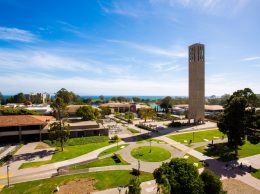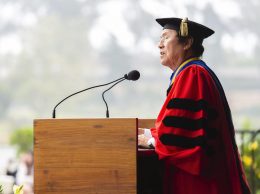Higher taxes are an inevitable consequence of ad-hoc policymaking, according to UC Santa Barbara economics professor Peter Rupert.
Rupert, who heads the UCSB Economic Forecast Project, told a breakfast audience of Santa Barbara-area business leaders on Dec. 8 that temporary subsidies such as “cash for clunkers” and payments to first-time homebuyers were largely useless.
He also decried the extension of unemployment benefits from 26 weeks to 104 weeks as a short-sighted policy that encourages laid-off workers to wait for better-paying jobs and whose costs will be borne by taxpayers in the future.
But he largely applauded the Federal Reserve for its actions to limit economic damage, and he said the Dodd-Frank financial reform bill has useful elements such as providing ways to measure risk and allowing regulators to wind down large institutions that are failing.
However, the level of uncertainty is extremely high, Rupert said. In expanding its balance sheet from $800 million to $2.6 trillion, he said, “the Federal Reserve is doing the right thing but the results are unpredictable.”
He said that for state governments grappling with pension obligations and for the federal government, there will have to be some bitter medicine to close the budget gaps. The Obama Administration’s deficit commission — which proposed new taxes as well as entitlement cuts — was on the right track, Rupert said.
But he said the Bush era tax rates, which would be extended for two years under a compromise between the White House and the GOP-led House of Representatives, are not sustainable.
“Eventually, taxes will have to go up to reduce the deficit,” Rupert said, adding that in an ideal world U.S. government tax policy would be the same in recession and recovery.
Rupert spoke at UCSB Chancellor Henry Yang’s community breakfast at the El Paseo restaurant in downtown Santa Barbara.
Are you a subscriber? If not, sign up today for a four-week FREE trial or subscribe and receive the Book of Lists free with your purchase.






 Print
Print Email
Email
















